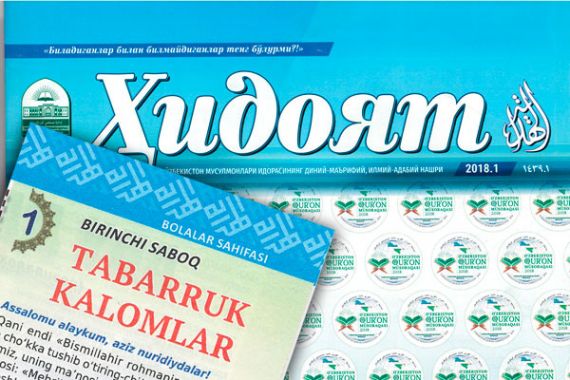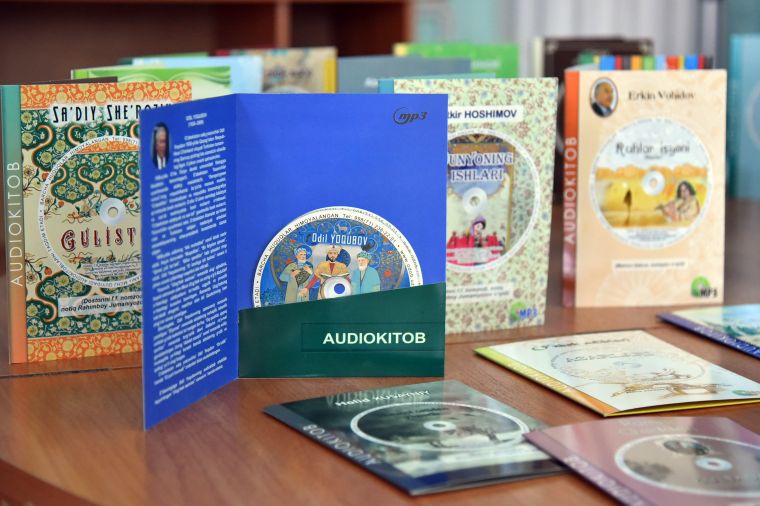Tashkent city



The first edition of 2018 of “Hidoyat” journal of Muslim Board of Uzbekistan has introduced new column with the title “Kids section” which foresees religious lessons for kids.
The lessons are given in Latin alphabet. Here is the first lesson presented.
First lesson: Respected words
Assalamu alaykum dear kids!
Now say “Bismillahir rohmanir rohim” and sit down. Why do we say so? Do you know the meaning? It means “I begin with name of Allah the Most Gracious and the Most Merciful”. Every muslim whatever he/she does they should start their actions with these words. Any action which started without “bismillah” would not have any ending. We muslims even do not eat meat of an animal which was slaughtered without “bismillah”.
There is also one another phrase you should know. It is “Auzu billahi minash shaytonir rojim” which is translated as “I seek refuge from the evil of abandoned devil”. If you read even one ayat from Qur’an then say first this phrase.
In order to read Qur’an you should first perform wudu. Makin wudu is not difficult. Firstly wash you hands with your elbows, then rinse you mouth three times, with indicating fingers wash your teeth, rinse your nose three times, and wash your face three times. Then water your hand and go around your head, ears with your wet palms. You can also ask your parents to show you how to do these acts and they would teach you.
Now this is enough dear kids! Good bye!
Ahmad Muhammad
If you want to get religious education for yourself or for your kids then continue to observe us on “Hidoyat” journal. For those who would like to subscribe the magazine, contact a representative in your nearest mosque. The journal “Hidoyat” (annual fee is 45 thousand soum) and the newspaper “Islom nuri” (annual fee is 36 thousand soum) are editions of Muslim Board of Uzbekistan.
Press Service,
Muslim Board of Uzbekistan

Uzbek literature Literature and art of Uzbekistan is called one of the bright and wonderful pages of the history of the world artistic culture. Along with Egypt and Mesopotamia, Greece and Rome, India and China, Central Asia laid the foundations of human civilization. The emergence of a cultural phenomenon in Uzbekistan is mainly due to its geographical Mesopotamia, where agricultural centers have been location in the Central Asian formed since ancient times. Uzbek literature history The most ancient Uzbek oral literary works are over 200 epic poems, many legends, epic songs performed by folk poets - bakhshi. Heroes of folklore struggle with hostile forces evil spirits, dragons. The oldest cycle of epic poems Ker-ogly and the poem Alpamysh were written around the 10th century. Alpamysh went in the folklore of all the peoples of Central Asia. It talks about the courage of folk heroes, courage and hatred of enemies; it contains many witty aphorisms, vivid metaphors, colorful descriptions. Another popular work from the cycle Ker-ogly is a poem about the transforming power of love of Ravshan-Hon. Many times later it was processed by folk poets. The satirical novels of Nasreddin Afandi, in which the khans and bais are derided, are popular. In the oral Uzbek literature, people of different nationalities - Chinese, Iranian, Turkmen, Negro, etc., female images are devoid of sentimentality. In the XI century, many works are created, based on religious norms of Islamic morality. These are the instructive poems "Kugadau Bilig" ("Knowledge of Grace" or "Science of Happiness") by Yusuf Khas Hadjib Balasaguni, the poem "Khibat al-Khakaik" ("Gift of Truths") by Ahmad Yugnaki.
Prepeared by Imam Bukhari Tashkent Islamic Institute , Department of languages , English teacher Kadirov Farrukh